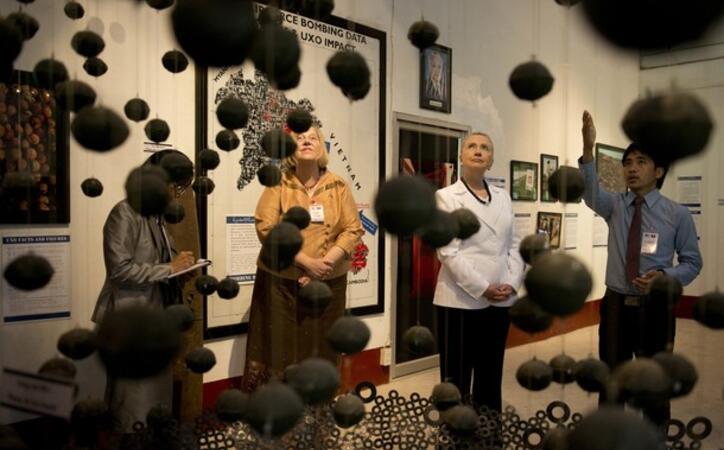During a historic visit to Lao PDR, U.S. Secretary of State Hillary Clinton met with cluster bomb victims and pledged further support to clear the country of deadly cluster munition remnants and other unexploded ordnance remaining in the country from the U.S. air campaign conducted more than 30 years ago.
During a visit to COPE (Cooperative Orthotic and Prosthetic Enterprise), a U.S.-funded prosthetic center in Vientienne, Clinton met a man named Phongsavath Souliyalat, who told her how he had lost both his hands and his eyesight from a cluster bomb on his 16th birthday, four years earlier.
A member of the "Ban Advocates," Phongsavath expressed his hope to Clinton that all governments will ban cluster munitions to prevent more victims in the future.
The Cluster Munition Coalition calls on the U.S. to not only commit funding for victim assistance and clearance, but also to join the Convention on Cluster Munitions, to demonstrate to the people of Lao PDR, and the whole world, that the US will never use cluster bombs again.
While observing a COPE display of a cluster bomb dispersing 665 bomblets or "bombies," Clinton commented, "We have to do more. That's one of the reasons I wanted to come here today, so that we can tell more people about the work that we should be doing together."
Clinton's trip marks nearly four decades since the end of the so-called ‘Secret War’ in which the U.S. dropped more than two million tons of bombs on Lao PDR, including cluster bombs containing more than 270 million submunitions. She was the highest serving U.S. government official to visit Lao PDR since U.S. Secretary of State John Foster Dulles in 1955.
COPE supports cluster munition survivors and people with physical disabilities across Lao PDR with physical rehabilitation. It played a central role in the creation of the 2008 Convention on Cluster Munitions and the convention's First Meeting of States Parties held in Vientienne in November 2010.
For more information, see:
